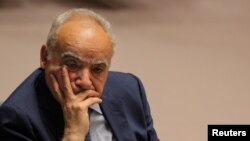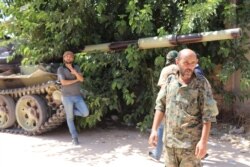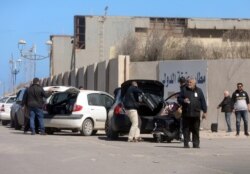The top U.N. official for Libya has called for a truce during the upcoming Eid al-Adha religious holiday, saying the fighting in that country needs to end before it “grows into a full-blown civil war.”
In a grim briefing to the U.N. Security Council on Monday, U.N. envoy Ghassan Salamé warned that the power grab for the capital, Tripoli, which began four months ago, could plunge the entire country into conflict and open the door to terrorist groups who are already a threat inside Libya.
“The recent uptick in violence may worryingly presage a new phase in the military campaign but I do not judge that this will fundamentally alter the strategic stalemate,” Salamé told the council via video link from Tripoli. “The parties still believe they can achieve their objectives through military means.”
The latest cycle of fighting began in April, after General Khalifa Haftar, who holds sway over the eastern part of Libya, advanced his forces on Tripoli in a bid to capture the capital from internationally-recognized Prime Minister Fayez al Sarraj and the Presidential Council. Since then, fighting in and around the city has killed more than 1,100 people, including more than 100 civilians, and displaced hundreds of thousands more.
Salamé said that the parties have ignored calls for de-escalation and instead ramped up the violence, intensifying their air campaigns, using precision air strikes, armed drones and heavy weapons, as well as employing foreign mercenaries. The fighting is also reaching beyond Tripoli to areas south and east of the capital.
He also warned that the security vacuum created by the fight for the capital is being exploited by the so-called Islamic State group, which has had a presence in southern Libya for several years, as well as by other extremist groups.
“Even more worrisome are the indications that the arsenal of weapons being delivered by foreign supporters to one side or the other is either falling into the hands of terrorist groups or being sold to them,” he said. “It is high time the warring parties cease all hostilities, redeploy their forces, and focus on the common threat before Libya becomes more of a safe haven for terrorist organizations.”
Attacks on Mitiga airport
In another troubling turn, the envoy said there have been a growing number of attacks on Mitiga airport, the only functioning airport in the Tripoli area.
“Several of these attacks have come perilously close to hitting civilian aircraft with passengers on board,” Salamé said. “I am afraid that with the almost daily bombardment, luck will run out.”
He urged the authorities in Tripoli to stop using the airport for military purposes and for Haftar’s forces to stop targeting it.
Thousands of migrants have also been caught in the fighting.
Salamé said this year, nearly 4,500 refugees and migrants have arrived in Libya and are at risk. More than 5,000 are currently detained, many in horrible conditions. Earlier this month at least 53 were killed and dozens injured, including children, in an airstrike on the Tajoura detention center, 16 kilometers east of Tripoli. On Friday, 150 migrants died in a shipwreck off Libya’s coast.
The U.N. has moved hundreds of migrants out of detention centers to safer locations, but Salamé reported that in recent days the authorities have moved more than 200 migrants back into the Tajoura facility. Salamé urged the closing of all migrant detention facilities.
“I urge the [Security] Council now to call upon the authorities in Tripoli to take the long-delayed but much needed strategic decision to free those who are detained in these centers,” he said.
A three-step plan
Salamé offered the council a three-step plan to move away from hostilities back to the political track, starting with a cease-fire for the Muslim holiday of Eid al-Adha which will be around August 10. That would be followed by confidence-building measures and a high-level meeting of concerned countries.
Libya’s chargé d’affaires at the United Nations, Elmadhi Elmajerbi, told VOA after the meeting that his government is open to a cease-fire, but on the condition that Haftar withdraws his troops from Tripoli.
“There was a broad support to these proposals of the Special Envoy, particularly on the first one, on a truce as a first step for this plan, that was widely accepted by the majority of the members,” said Peruvian U.N. Ambassador Gustavo Meza-Cuadra who is Security Council president this month. “On the specifics, some of the members will consult their capitals,” he added.
He said he expects a formal statement from the security council in the coming days.


